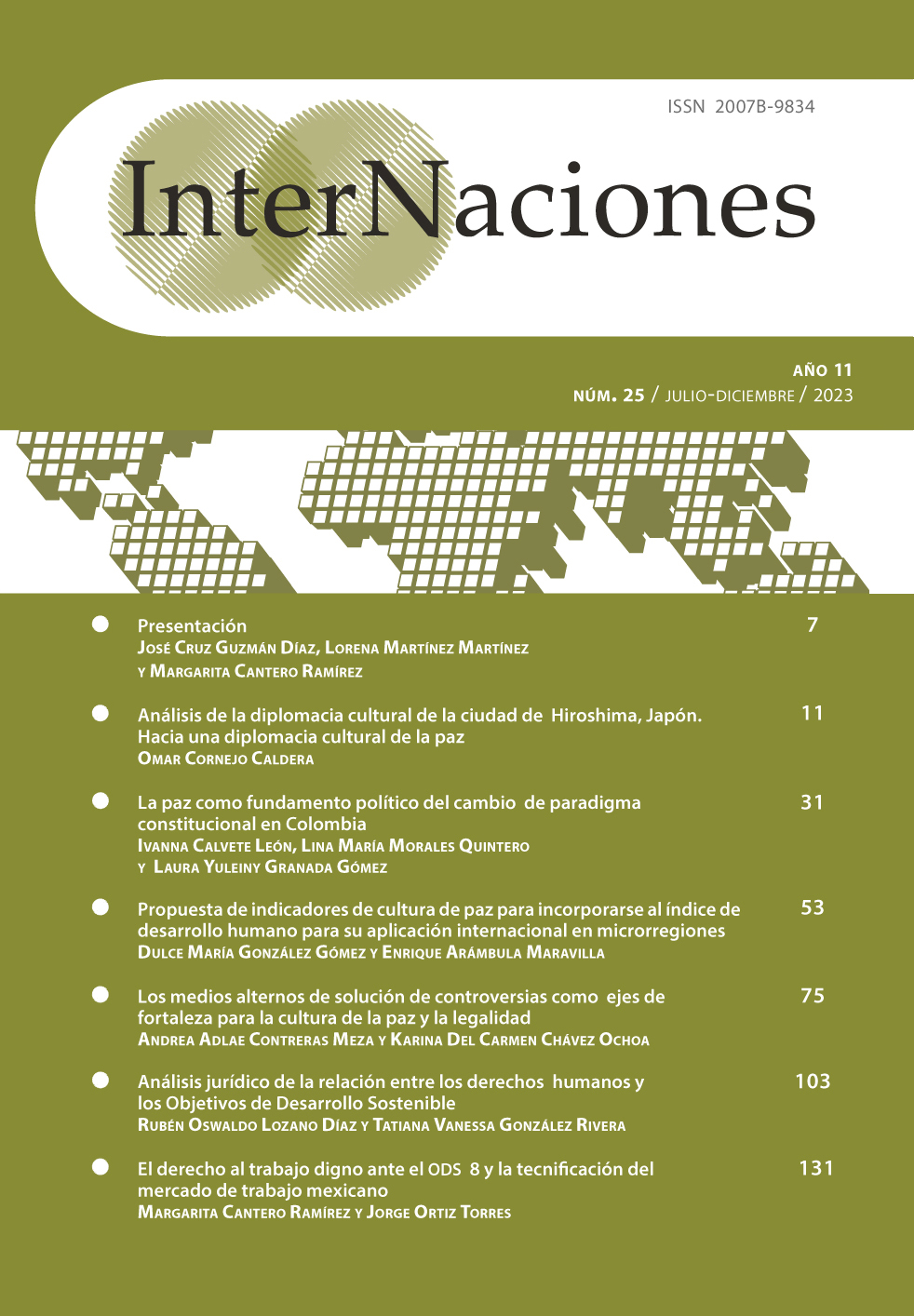Electoral abstentionism is not a right
DOI:
https://doi.org/10.32870/in.vi25.7254Keywords:
Electoral Abstentionism, Democracy, Citizen Participation, Law, Annulled BallotAbstract
Electoral abstentionism is harmful to democratic countries, unfortunately, it is increasingly occurring. This practice is adopted, as a form of disagree-ment, however, it is not a right; therefore, the objective is to show that elec-toral abstentionism is not the most efficient option to manifest disagreement with governments nor does it have effects of change. The foregoing with a methodology where a data collection technique from a documentary source was applied mainly in cybernetic media, under the criteria of using only information with a scientific precedent and with no more than 5 years of publication. The information collected was subjected to an analysis of quali-tative results, where the content was examined in four phases, categorizing democratic and “mixed” countries; structuring those that force voting and those that do not, later contrasting them and concluding that there are more efficient citizen participation practices as means of protest.Downloads
References
Austudillo, C. y Navarret Prida A. (2018). El Derecho Electoral en el Federalismo Mexicano, Secretaría de Cultura, INEHRM: Secretaría de Gobernación: UNAM, Instituto de Investigaciones Jurídicas. https://www.inehrm.gob.mx/recursos/Libros/DerechoElectoral.pdf
Beleño Pitalua, Y. y Vásquez Tilvez, J. (2017). El voto obligatorio en Colombia, Revista ANFRADE LA UAM, https://www.redalyc.org/journal/3578/357851475006/html/ https://doi.org/10.30854/anf.v24.n42.2017.168
Central Electoral, Elecciones 2021,
¿Sabías que las elecciones del 6 de junio tuvieron una alta participación ciudadana? Instituto Nacional Electoral. https://centralelectoral.ine.mx/2021/06/08/sabias-que-las-elecciones-del-6-de-junio-tuvieron-una-alta-participacion-ciudadana/
Constitución Española de 1978, Senado de España, Boletín Oficial del Estado núm. 233, de 27 de septiembre de 2011. https://www.senado.es/web/conocersenado/normas/constitucion/index.html
Constitución de la República Federativa de Brasil de 1988, Supremo Tribunal Federal Secretaria de Documentação, 2020. https://www.stf.jus.br/arquivo/cms/legislacaoConstituicao/anexo/CF_espanhol_web.pdf
Constitución Política de la República de Chile, de 1980, Cámara de Diputadas y Diputados, texto actualizado a 28 de abril de 2021. https://www.camara.cl/camara/doc/leyes_normas/constitucion.pdf
Constitución Política de la Republica de Colombia, de 1991, Secretaria General del Senado de la Republica, Congreso de la Republica Colombiana, Diario Oficial No. 52052 - 01 de junio de 2022. http://www.secretariasenado.gov.co/constitucion-politica
Constitución Política de los Estados Unidos Mexicanos, de 1917, Última reforma publicada DOF 28-05-2021. https://www.diputados.gob.mx/LeyesBiblio/pdf/CPEUM.pdf
Constitución Política del Perú, de 1993, Resolución Legislativa 021-2020-2021-CR diario oficial El Peruano actualizada al mes de julio de 2022, Congreso Constituyente Democrático. https://lpderecho.pe/constitucion-politica-peru-actualizada/
Corso Sosa, E. (2015). Derecho Humano de Manifestación Publica: Limitaciones y Regulación. Investigaciones Jurídicas de la UNAM. Biblioteca Jurídica Virtual del IIJUNAM. https://archivos.juridicas.unam.mx/www/bjv/libros/8/3826/8.pdf
Foro Democrático Ciudadanía y Participación, de 2020, Estrategia Nacional de Cultura Cívica, Instituto Electoral INE, Instituto de Investigaciones Jurídicas de la UNAM, https://farodemocratico.juridicas.unam.mx/las-diversas-formas-de-participacion-politica/#tri-tema-5
Hermida Rosales, C. (24 de febrero de 2020). Votos nulos pueden marcar diferencia en resultados electorales: Claudio Castro. UNIVERSO Sistema de Noticias de la UV. https://www.uv.mx/prensa/general/votos-nulos-pueden-marcar-diferencia-en-resultados-electorales-claudio-castro/
Information Sverige Guiden till Svenska Samhället de 2021, Länsstyrelserna Diputación Provincial de Västra Götaland. https://www.informationsverige.se/es/omsverige/att-paverka-i-sverige/det-svenska-valsystemet/
Leyva Cordero, A. Hernández Paz y Tamez González (2021). Los jóvenes en su entorno político: contribución a las políticas educativas para la formación ciudadana, REVISTA DE ESTUDIOS ESTRATEGICOS UTEM, https://revistaepe.utem.cl/articulos/los-jovenes-en-su-entorno-politico-contribucion-a-las-politicas-educativas-para-la-formacion-ciudadana/ 0719-3653
Montero, J. R. y Fernández Esquer, C. (2018). Cuatro décadas del sistema electoral español, 1977-2016. Política y Gobernanza. Política y Gobernanza, Revista de Investigaciones y Análisis Político, https://revistaseug.ugr.es/index.php/polygob/article/view/7821
Morales Noble, V. (2017). La abstención y el voto nulo son vistos como comportamientos que demeritan la democracia, Revista Mexicana de Ciencias Políticas y Sociales ELSEVIER, https://www.elsevier.es/es-revista-revista-mexicana-ciencias-politicas-sociales-92-articulo-abstencion-voto-nulo-elecciones-federales-S0185191817300181
Observatorio de Igualdad de Género, España Sistema Político Electoral del Gobierno Municipal al 2022, CEPAL- Naciones Unidas, Cooperación Española, Secretaria General Iberoamericana. https://oig.cepal.org/es/paises/91/system
Participación electoral por región plebiscito 2020, Servicio Electoral de Chile SERVEL. https://www.servel.cl/participacion-electoral-por-region-plebiscito-2020/
Pisany-Ferry, J. (21 de junio de 2022) La constitución de Francia a prueba. Project Syndicate, The Word´s Opinion Page. https://www.project-syndicate.org/commentary/france-parliamentary-election-political-divisions-by-jean-pisani-ferry-2022-06/spanish
Requisitos Aplicables a los Ciudadanos Europeos que Quieran Votar en las Elecciones Municipales en España, de 24 de enero de 2022, Gobierno de España, Punto de Acceso General, Carpeta Ciudadana. https://administracion.gob.es/pag_Home/eu/Tu-espacio-europeo/derechos-obligaciones/ciudadanos/residencia/elecciones/municipales.html#:~:text=En%20Espa%C3%B1a%20no%20es%20obligatorio%20el%20ejercicio%20del%20derecho%20al%20voto.
Sonnleitner, W. (2019). La diversidad del voto nulo en México, Revista mexicana de sociología, http://www.scielo.org.mx/scielo.php?script=sci_arttext&pid=S0188-25032019000400697 https://doi.org/10.22201/iis.01882503p.2019.4.57974
The Instrument of Goverment of Sweden de 1974, The Riksdag of Sweden. https://wipolex.wipo.int/es/legislation/details/11805
Downloads
Published
How to Cite
Issue
Section
License
Copyright (c) 2023 University of Guadalajara

This work is licensed under a Creative Commons Attribution-NonCommercial-ShareAlike 4.0 International License.
CC BY-NC-SA 4.0 https://creativecommons.org/licenses/by-nc-sa/4.0/



























